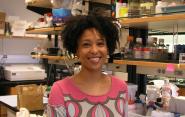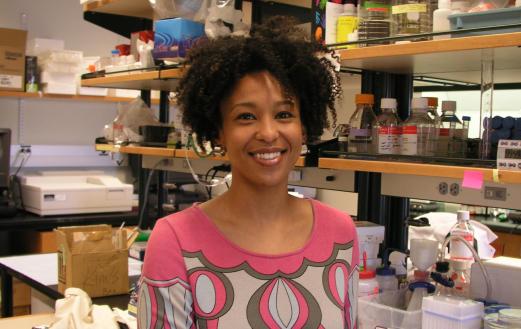Anjelica Gonzalez named to the Donna L. Dubinsky endowed post

Anjelica Gonzalez, newly appointed as the Donna L. Dubinsky Assistant Professor of Biomedical Engineering, develops biomaterials as tools for investigating human immunological disease, with a particular focus on inflammation.

To this end, Gonzalez has recently created two artificial tissues, a humanized vessel and a model of the body’s extracellular matrix (ECM). The humanized vessel, which exists outside the body, is engineered with multiple human cell types, while the ECM model is constructed entirely from a biocompatible polymer commonly used in medicine because of its ability to mimic nonliving connective tissue like fibronectin, collagen, and laminin. The artificial ECM can also be structurally, mechanically, and biochemically tuned to replicate not only healthy tissue but also various states of diseased tissue.
Gonzalez has used her lab’s humanized vessel to elucidate how cells signal each other through cell-cell contact, the release of soluble signals, and the deposition of the connective proteins, while the artificial ECM has aided basic investigations into how cells crawl in tissue and replicative substrates. Her work with these tissues contributes to our understanding of an array of diseases and disorders associated with inflammation, including arthritis, diabetes, cancer, and fibrosis; additionally, these biomaterials have also been used to create therapeutics for wound healing.
Beyond her research contributions, Gonzalez has demonstrated a dedication to global health initiatives through her work with the Global Heath Leadership Institute, and contributed her engineering expertise to the design of low-cost, innovative medical solutions for developing countries. Her efforts in education were also recently recognized with the Yale Provost’s Teaching Prize for 2013-2014.
Gonzalez received her B.S. from Utah State University then a Ph.D. in Structural and Computational Biology from Baylor College of Medicine, where her dissertation focused on computational 3D tracking of cell movement in polymer systems. After a postdoctoral fellowship in the Leukocyte Biology and Pediatric Intensive Care Unit at Texas Children’s Hospital, Gonzalez worked at Yale for two years as an associate research scientist before she joined the biomedical engineering faculty.

